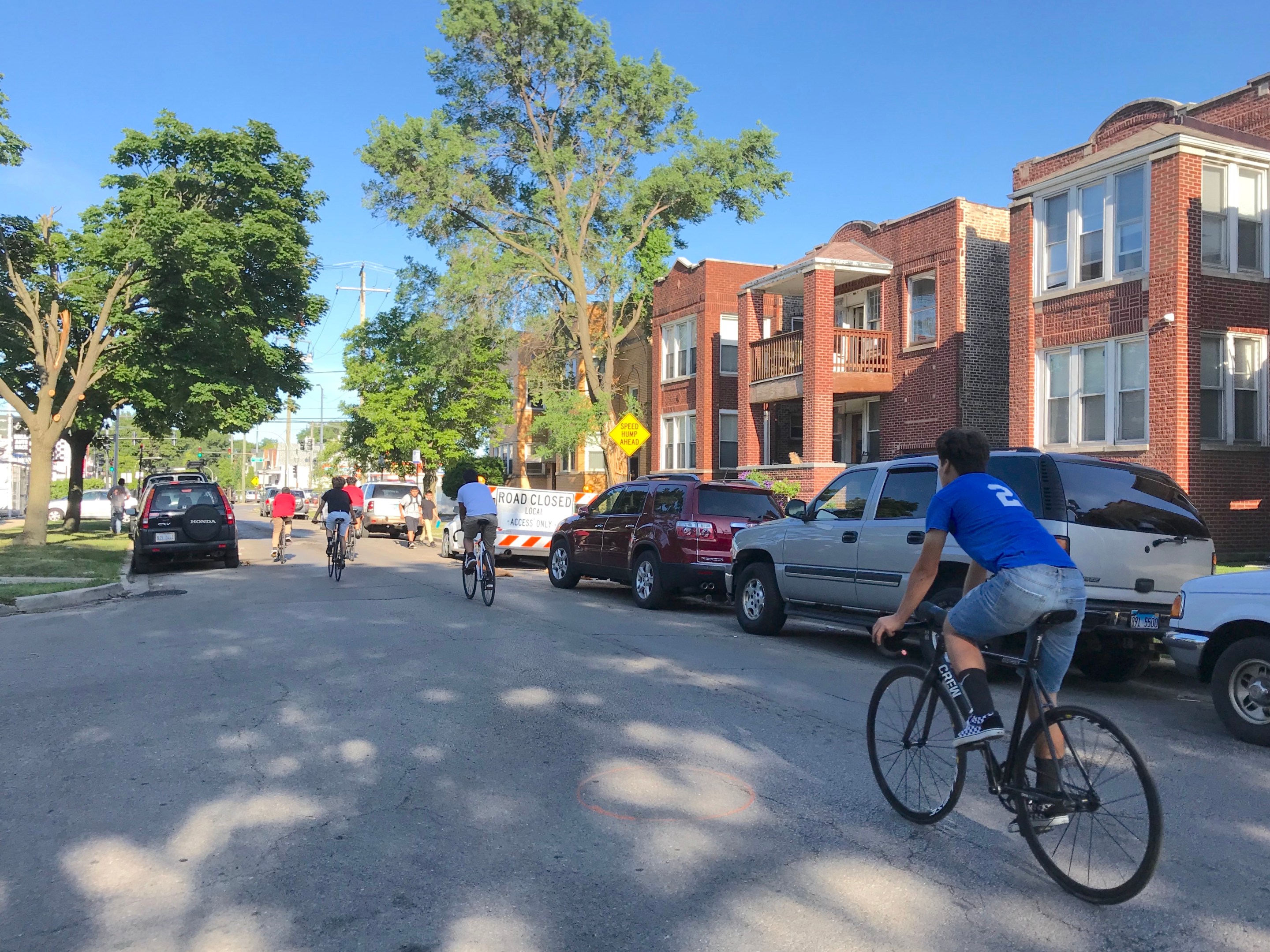The Chicago Department of Transportation hosted the third and final Chicago Mobility Collaborative meeting of 2022 last Thursday from 6 to 7:30 p.m. at the Garfield House Field House. The previous meetings held on June 20 and September 29 were online-only, while this one was in-person-only. CDOT will post notes, the PowerPoint, and a video of the event to its website at a later date.
The grassroots organization Chicago, Bike Grid Now led "Bike Bus" rides to the event from locations across the city, so many of the meeting attendees showed up on two wheels.
Headed to the Chicago Mobility Collaborative today at Garfield Park Field House? Hop on one of FIVE Bike Buses! Check the flyer for meetup and roll time for our North Side, Lakeview, Logan Square, Loop, and Pilsen Buses.
— Chicago, Bike Grid Now! (@bikegridnow) December 8, 2022
You can also track the bus here: https://t.co/z5mj110Xmm pic.twitter.com/RZeDNUblkf
"It’s just great to see people’s faces," said CDOT consultant Riley O'Neil, who helped lead the meeting. "We have such different interactions when we’re not on a screen but are actually in person and sitting physically at a table and speaking and hearing. It’s so valuable. So I feel just happy that we’re finally able to have them in person and look forward to reviewing the feedback and see what will come from the next meetings."
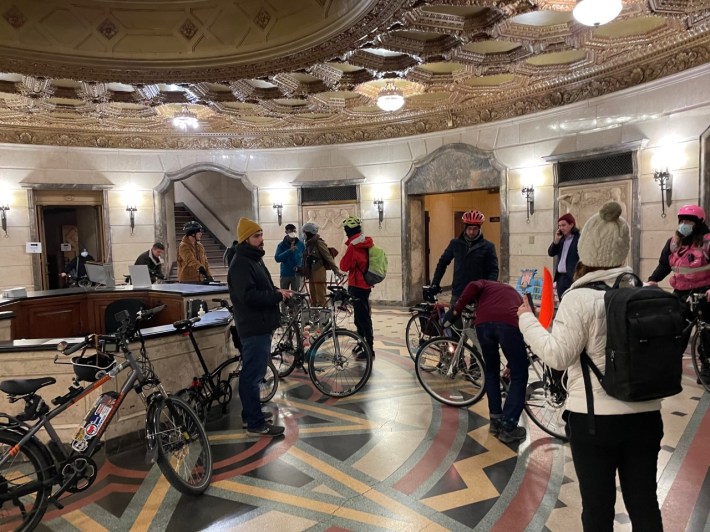
Attendees had the choice of sitting at one of four tables, each of which covered a different subject. I sat at Table 4, which centered on mobility equity advocacy: community priorities and key partnerships. A note attached to the table explained, "This table will focus on conversations at the intersection of mobility and other community priorities that impact the quality of life, as well as on the importance of establishing key partnerships to effectively elevate the voices and needs of community members. This table seeks to hear from others what mobility equity means in your community, what the challenges and opportunities are and how we can work together towards common goals."
Leading the discussion at Table 4 was Jeremy Cuebas, the transportation organizer at the Northwest Center, a nonprofit organization located in the Belmont Cragin community, where Cuebas grew up. The center has the Belmont Cragin Youth Leadership Council, comprised of about forty young people.
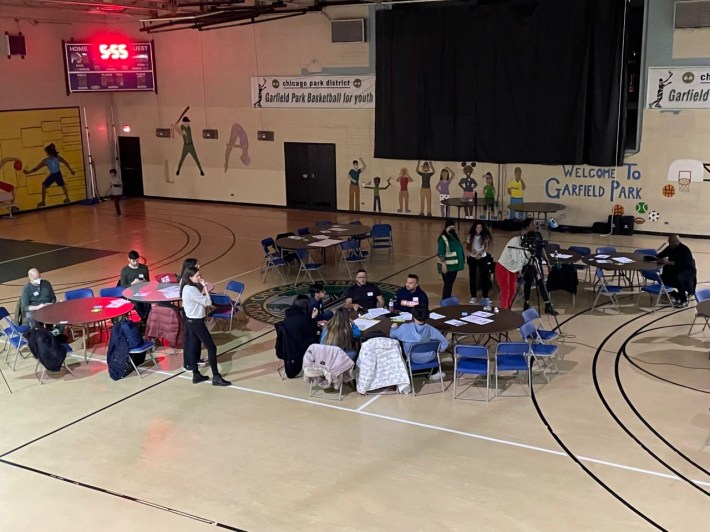
According to Census data, the population of Belmont Cragin is currently 78,116 people, with almost a third of them 19 or younger. The neighborhood is about 82 percent Latino, and a 2014 study estimated that there were about 12,000 undocumented residents in the community.
Since so many Belmont Cragin residents are youth, many residents don't drive and instead rely on walking, biking, transit, and rides from relatives, to get where they need to go. Back in August 2019, Northwest Center youth organizers Michael Hernandez, was riding his bike in the neighborhood on Belmont Avenue, where there were no bike lanes. Someone getting out of a car failed to check for bikes and "doored" him, causing injuries that required hospitalization.
While Hernandez fully recovered from the crash, in response to the incident the youth council members held an emergency meeting to discuss how they should respond. Over the following months, they came up with three goals:
- Go from 1.2 miles of bike lanes in the neighborhood to five miles or more
- Go from zero Divvy bike-share stations in the community to one or two
- Improve the #76 Diversey Avenue bus route from an F rating, according to the Active Transportation Alliance's Bus Friendly Streets Report Cards rankings, to a C or better
Then the COVID-19 pandemic hit Chicago in March 2020, dominating all of the center's work. The youth council reached out to CDOT to provide feedback on where bikeways and Divvy stations were needed in the area. That October, CDOT, Divvy, and the council started to host community bike rides to help identify where bike infrastructure should go. Cuebas said the streets were so deserted back then, the neighborhood was like the Will Smith movie "I Am Legend," about the last person left alive in New York City after a virus wipes out most of humanity. But he added that the rides were fun, and gave participants a chance to really assess biking conditions in the community.
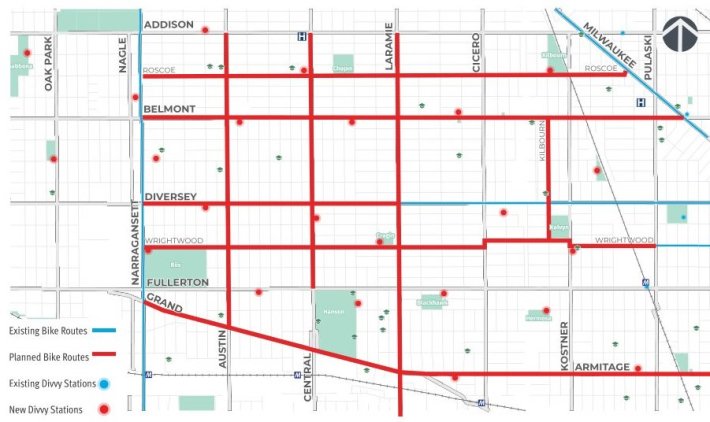
After that, the Northwest Center hosted community meetings to get more feedback on where bike amenities should be located. Then CDOT and NWC asked small businesses for input, and the local alderpersons helped spread the word. In June 2021, CDOT began to stripe new bike lanes, and in August there was a ribbon-cutting for the neighborhood's first bike-share station at Cragin Park. That winter the center and the local bike education center Bikes N' Roses held a series of "Pump the Brakes" Zoom workshops for both bike riders and drivers, covering "laws of the road, safety tips, and facilitated conversation between bikers and drivers to build harmony whether you’re on two wheels or four."
Cuebas said that while mobility, equity, and advocacy are important to talk about, it's even better to put these principles into action. After the rundown of bike initiatives in Belmont Cragin, Table 4 talked about lessons they could take to their own communities, including tips on working with CDOT and the local ward office. However, some of the participants said they would like to overhaul Chicago's system of installing bike infrastructure, which requires approval from a different alderman for projects in different parts in the city, a piecemeal process that has prevented Chicago from having a cohesive bike network.
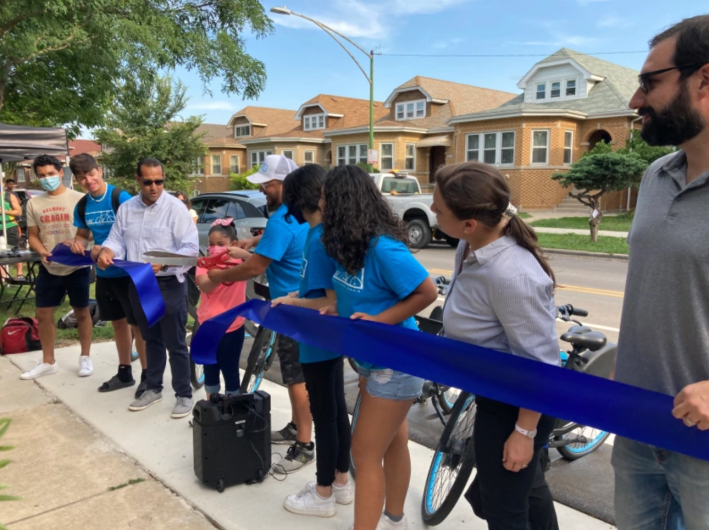
"At my table, we kind of learned a lot from another community member, so it was less hearing from CDOT and more hearing from someone else’s experience, which I appreciated," said Table 4 participant Michael McCarthy. "But at the same time, I don’t think CDOT is moving fast enough, and I also think the location and time were difficult to get here for me personally and for a lot of other people."
"I thought it went pretty well," said fellow bike advocate Karen Kazmierczek, but she added, "I was expecting something different. I was expecting something more of a town hall format... And so the opportunities to actually be heard by CDOT, I think, were a little lacking. On the other hand, the small breakout groups really gave me a chance to get to know the other people who care about these issues in the community, and that was really rewarding and, long term, it’s a good thing."
